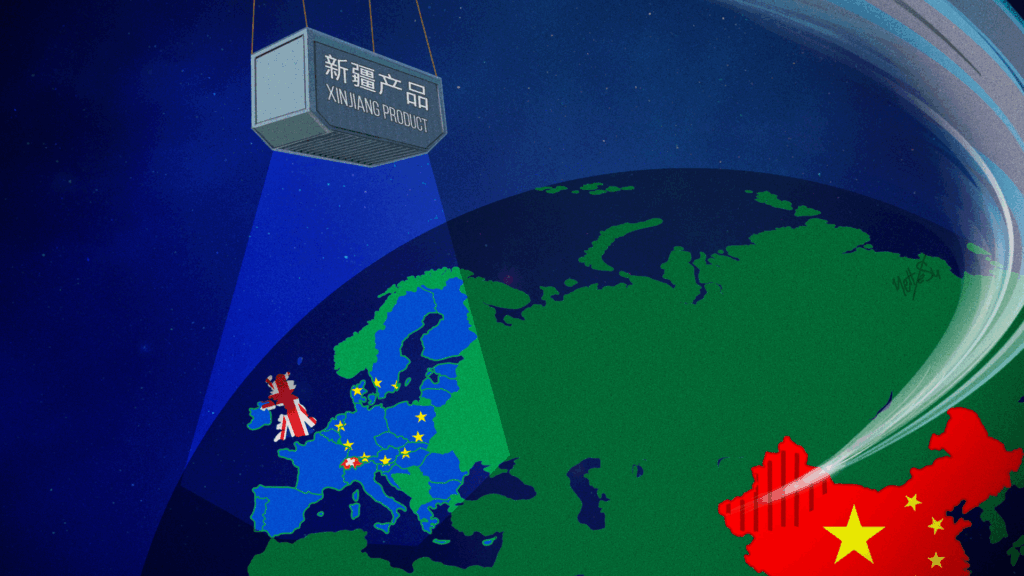UHRP Research Reveals Surge in Cargo Flights Embedding Uyghur Forced Labor Risks in European Supply Chains

July 30, 2025 | 7:00 a.m. EDT
For Immediate Release
Contact: Omer Kanat +1 (202) 790-1795, Peter Irwin +1 (646) 906-7722
A new report from the Uyghur Human Rights Project (UHRP), authored by Peter Irwin and Dr. Henryk Szadziewski, has uncovered the rapid expansion of air cargo routes connecting Ürümchi with over a dozen cities across Europe. This new trade corridor risks deepening Uyghur forced labor in European supply chains and complicates European commitments to end imports tainted by forced labor.
The report, Manifest Risk: New “Air Silk Road” Cargo Flights Carry Risk of Uyghur Forced Labor into Europe, documents how, since June 2024, nine cargo companies have launched new air freight services between Ürümchi and destinations in the European Union (EU), the United Kingdom (UK), and Switzerland.
“These cargo routes are not just logistical developments, they represent a dangerous normalization of trade with a region where atrocity crimes are ongoing and forced labor is widespread,” said Peter Irwin, Associate Director for Research and Advocacy at the Uyghur Human Rights Project. “Goods transported on these flights are at high risk of being produced through a system of state-imposed forced labor that is integral to a broader campaign of repression targeting the Uyghurs.”
Since June 2024, cargo companies have operated direct flights from Ürümchi to London, Bournemouth, Cardiff, Bucharest, and Budapest, as well as indirect flights to European cities including Leipzig, Vienna, Zurich, and Athens. According to Chinese state media, cargo on these flights include textiles, footwear, electronics, and agricultural products, all sectors that have been documented as linked to state-imposed forced labor targeting Uyghurs and other Turkic peoples. State media also note the presence of e-commerce goods on many of the flights.
“Europe’s commitment to eradicating forced labor from supply chains must extend beyond policy declarations. It must result in real, measurable action to disrupt the economic mechanisms that sustain atrocities. Every uninspected shipment from Ürümchi represents a failure to act—and a potential violation of Uyghur human rights,” said UHRP Director of Research, Dr. Henryk Szadziewski.
The emergence of this expanded air trade corridor is part of the Chinese government’s “Air Silk Road” strategy, a component of the Belt and Road Initiative. The strategy aims to position Ürümchi as a central logistics hub for transcontinental cargo, integrating the Uyghur Region more deeply into global markets.
The rapid expansion of air cargo routes between the Uyghur Region and Europe poses a growing threat to the integrity of European supply chains. By freighting goods from a region where state-sponsored forced labor programs have been widely documented, cargo airlines, along with importers, may be at risk of benefitting from labor rights violations. Importantly, these programs form part of a wider system of repression and state-led atrocity crimes targeting Uyghurs.
Despite clear evidence of Chinese state atrocity crimes in East Turkistan, international trade routes from the Uyghur Region continue to operate with minimal scrutiny from lawmakers. Without immediate action to close enforcement gaps and inspect high-risk cargo, European governments risk becoming complicit in perpetuating state-imposed forced labor in the Uyghur Region.
“Years after evidence emerged of mass internment, forced labor, and other severe abuses against Uyghurs, governments in Europe have yet to take the necessary steps to block the flow of goods linked to this repression,” said Omer Kanat, Executive Director of the Uyghur Human Rights Project.
The growth of these routes should raise immediate red flags for policymakers, customs authorities, and companies. In response, UHRP is calling for the following actions:
- The EU and the UK should examine all direct and indirect freight routes originating in Ürümchi or other airports in the Uyghur Region.
- The EU and the UK should require customs authorities to disclose all import data (including air freight) by shipper, consignee, origin, destination, carrier, and commodity type.
- The EU should designate the Uyghur Region as a high-risk area for forced labor under the EU Forced Labour Regulation, enabling targeted inspections and a presumption of forced labor risk in all supply chains emanating from the Uyghur Region.
- The UK should introduce legislation banning the import of goods produced using forced labor, and amend existing legislation to require mandatory human rights due diligence for companies importing from high-risk regions, with legal consequences for non-compliance.
- Cargo companies should cease all air cargo operations originating in the Uyghur Region, given the impossibility of conducting credible human rights or labor rights due diligence in the region.
